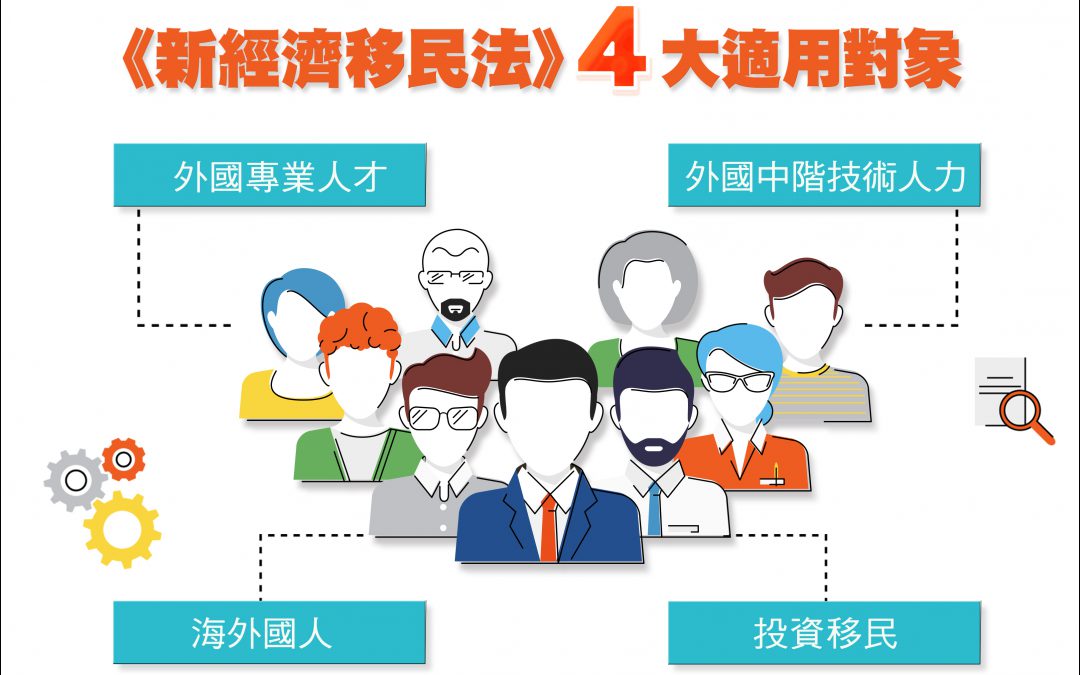New Economic Immigration Bill

The impact of Taiwan’s low birth rate and population aging is growing increasingly evident. The country’s working age population began to fall after reaching its peak in 2015. The total population is projected to start exhibiting negative growth in 2022, with the working age population falling below 66.7 percent of the total population in 2027, bringing the period of its demographic dividend to an end.
Taiwan urgently needs to respond to these changes in the demographic structure, and to the difficulties caused by pronounced shortages of the technical talent required by domestic industries, by recruiting and supplementing high-grade foreign talent and manpower to augment the human resources needed for national development. As a means to boost industrial upgrading, maintain a reasonable population structure, and raise national competitiveness, this is a vital objective that brooks no delay.
The New Economic Immigration Act (herafter referred to as “this Act”) will relax and broaden the applicable scope of regulations governing qualification to work and stay in Taiwan, access to permanent residence, rights of dependents, and other aspects of the treatment offered to foreign professionals, foreign mid-level technicians, overseas compatriots, and investment immigrants. Also, given that regulation of economic immigration is currently dispersed among various immigration laws and regulations, this new act will serve to enhance administrative efficiency and focus policy implementation by bringing together all pertinent provisions in a single statute, thereby adding greater force to recruitment efforts.
To better attract the foreign professionals needed for the digital economy era and the rapid shift in business models, it is proposed to liberalize the categories of industry and occupation in which their employment is permitted, with adoption of a negative list approach. In addition, a points system will be utilized for screening the work qualifications of foreign professionals, to establish more diverse employment conditions, and capital and turnover requirements will be relaxed for employers in key industries, to help businesses recruit the kinds of high-caliber international talent they need.
To solve the shortage of mid-level technical manpower needed by domestic industries, reference was made to international practices in mapping out proposals for the employment of foreign students and basic-level foreign personnel who possess mid-level technical work skills, or for directly importing foreign nationals with mid-level technical work skills. Such kinds of technical manpower will all have to meet requirements of salary level and work qualifications. There will also be a total number cap and individual industry quotas. With regard to the direct import of mid-level technical manpower from abroad, the schedule and scope of this will be separately announced by the Executive Yuan, depending on the situation of employment of the other two aforesaid types of technical manpower and the development needs of domestic industries.
In addition, considering the large number of our compatriots residing overseas, and that there are many among them with prime skills and expertise, who ought to be actively targeted for recruitment, this bill proposes relaxing the current entry permit,registered permanent residence and other rules applicable to overseas compatriots who possess ROC nationality under the provisions of the Nationality Act.
On the basis that investment immigrants come within the scope of economic immigration, and is also an object of active promotion by the government, but considering that Taiwan’s current avenues and conditions for investment immigrants are already quite diverse and relaxed compared to neighboring countries, current regulations relating to investment residency, permanent residency and registered permanent residence are integrated in this bill to achieve the purpose of policy declaration.
The bill proposes relaxing conditions pertaining to permanent residency, dependents, and so on for foreign professionals, as well as stipulating conditions for permanent residency of mid-level technicians, and conditions for residency and permanent residency of their dependents. For foreign nationals who obtain permanent residency, it proposes providing ancillary measures of Employment Insurance and new labor pension system coverage and relevant social security and living assistance, to establish a friendlier immigration environment.
〔Original :National Development Council 〕